- Home
- News
- Recent News
- Professors, Students, and Community Leaders Expres
Professors, Students, and Community Leaders Express Hope for UMass Boston’s Strategic Plan
Office of Community Partnerships Hosts Sixth Annual Fireside Chat
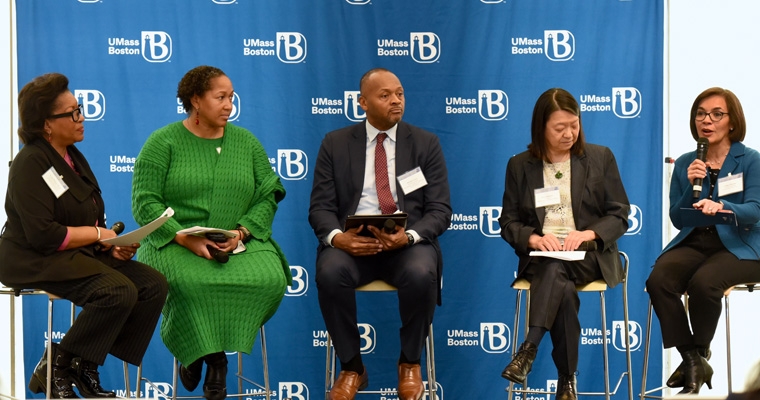
“ I hope starting today that no conversation in the city happens without UMass at the table. ”
As the only public research university in the region, UMass Boston’s plans and actions are tied to the community in a very special way.
More than 80 community leaders, faculty, staff, and students came together last week to reflect on UMass Boston’s new ambitious 10-year strategic plan, For the Times, discussing how the university will move from plan to action, and where there are opportunities for greater community collaboration.
“Often people talk about academic institutions as the ivory tower. I think that’s absolutely the wrong model,” said panelist Reverend Mariama White-Hammond, chief of Environment, Energy, and Open Space for the City of Boston. “There should be utterly blurred lines between the college and community, between the work the university does and what is going on in communities. I think there’s a lot of the seeds for that, the vision for that in the plan. I would love to see that grow.”
The discussion was part of “New Plan, New Opportunity for Action: Community Reflections on UMass Boston’s New Strategic Plan,” which was hosted by UMass Boston’s Office of Community Partnerships and facilitated by Karen Holmes Ward, director of public affairs and community services and host and executive producer of CityLine at WCVB Channel 5 Boston.
Chancellor Marcelo Suárez-Orozco explained that at UMass Boston, being “for the city” and “for the times” is a special responsibility.
“We see our strategic plan as a roadmap that will assist the legislature, the Healy Administration, and Mayor Michelle Wu’s office, through its teaching, research, and service – by preparing a diverse, workforce; informing equitable public policy; strengthening Boston’s resilience; and so much more,” Suárez-Orozco said. “The strategic priorities in For the Times are closely aligned with the city’s interests. And this has strengthened partnerships and inspired public mindedness in our students and faculty.”
Provost Joseph Berger gave attendees an overview of the plan, which is anchored by several strategic priorities that will guide UMass Boston’s operations over the next decade and support the educational goals of UMass Boston students, including: a focus on holistic student success, standing for the city of Boston, a reimagined campus space, and impactful research and scholarship around four grand scholarly challenges: climate equity, health equity, education for the future, and a just society.
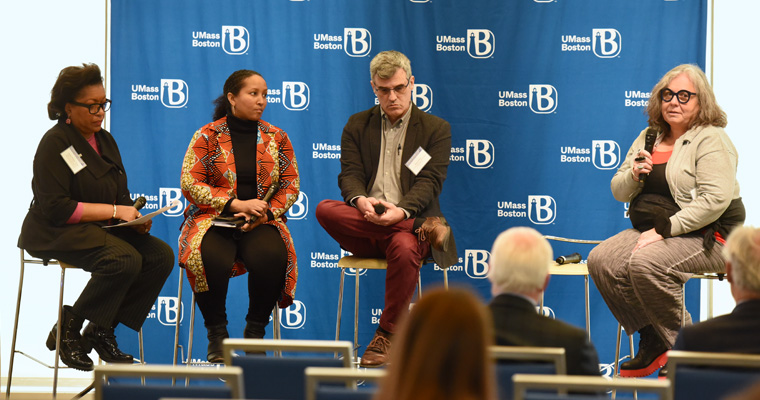
Holmes Ward facilitated a conversation with faculty members Aminah Pilgrim, senior lecturer in Women's Gender, and Sexuality Studies and Critical Ethnic and Community Studies; Betsy Sweet, associate professor of Equitable and Sustainable Development; and Pacey Foster, associate professor of Management.
As the university moves forward in a more community-engaged way, it must first look at how it defines community, Pilgrim said.
“Every time I hear folks talk about the community as if it’s outside of here, that is a place where I think we can grow,” she said. “Because we are the community. Many of the faculty live right near our students, right? We are the communities that we aim to shape. I think if we start there that would shift a lot of things, because we’re talking about where we live, where we raise our kids.”
Foster called the strategic plan “a beautiful vision.”
“I love the value-centered nature of it. It seems different for me,” he said. “We’ve been a community-engaged campus since our founding, and I love seeing this brought to the front of this plan. Like all great visions it comes down to where are the resources? How does the budget from last year or two years ago change to reflect the strategic visions?”
Sweet emphasized that the university community must “embrace cultural humility as we are doing our work.”
“We need to take our knowledge and put it into perspective; we need to make sure that we don’t put our knowledge above anybody else’s; we need to walk in communities and understand that … regardless of our origin we have privilege; and we need to make sure that that privilege is not blocking us from our engagement with folks,” she said. “That our engagement is reciprocal, and built on openness and trust, and that it is long-term.”
Holmes Ward also moderated a panel with community leaders White-Hammond; Celina E. Miranda, executive director of the Hyde Square Task Force; Michael Curry, president of the Massachusetts League of Community Health Centers; and Pam Eddinger, president of Bunker Hill Community College.
Leaders discussed how UMass Boston’s colleges and institutes need to continue to provide research that affects the city’s most vulnerable populations, while also supporting and preparing the city’s students to enter the workforce and tackle the most pressing issues— healthcare, education, climate change, social justice.
Miranda encouraged UMass Boston to recognize all the assets available in the community.
“We are there. We want to partner. We want to be part of you,” she said. “We want those walls to crumble. We want to feel that Jamaica Plain and the Latin Quarter feels like an extension of the UMass campus, because there’s so much work we can do together.”
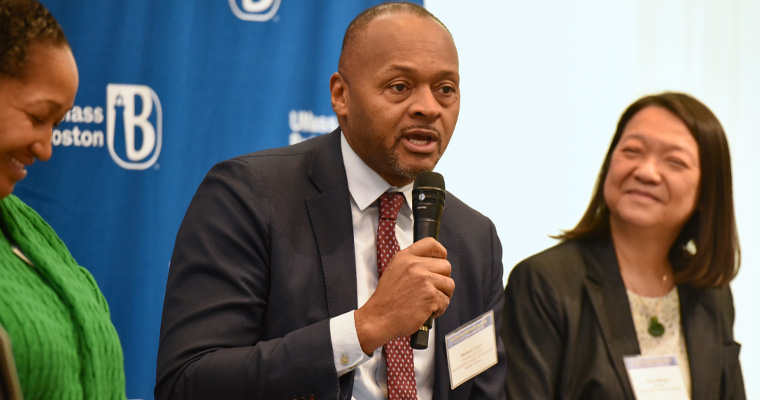
Curry spoke about how the university is positioned to play a key role in solving what has become a major workforce crisis in healthcare.
“We have not invested in the next generation of providers, of public health experts, and now folks are kind of turning around and saying ‘what did we miss and what can we do about it?’” Curry said. “UMass has a critical role to play. … What I’m excited about is reading the strategic plan and it’s about scaling that up, it’s about collaborating with community in a way that can grow that in a diverse pipeline.”
White-Hammond said as the city moves toward its goal of making Boston carbon neutral by 2050, UMass Boston, with its harborside campus location and its focus on environmental science, has both a responsibility and opportunity.
“How can you do that work in a way that’s not just about hiring an architectural firm and just moving forward? How does it become a learning experience for the entire campus and a learning experience for the entire city?” she asked. “There’s not many places that are quite as vulnerable to climate change, and while that creates a level of urgency, it also creates an amazing learning opportunity.”
Eddinger said Bunker Hill Community College will continue to build its partnership with UMass Boston, doing the important work of preparing the city’s population for the workforce, meeting them where they are, and helping to lift them up.
“I hope starting today that no conversation in the city happens without UMass at the table,” she said.
The event featured a video, “Student Voices,” curated by Mass Media staff Katrina Sanville, Kaushar Barejiya, and Valentina Valderrama Perez, that includes interviews of students and alumni discussing the strategic plan. Watch the video. Attendees also were able to view a poster gallery of UMass Boston Community-Engaged Grandscholarly Challenges In Action.
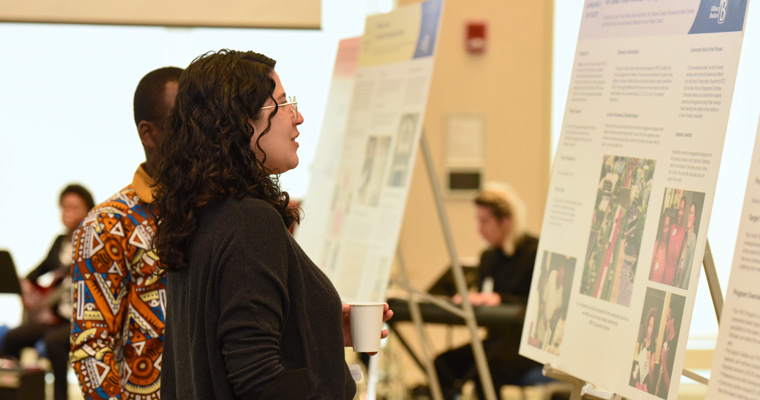
“We at UMass Boston have the responsibility to serve our communities in Dorchester, in East Boston, and throughout Massachusetts,” Valderrama Perez said. “There are many people who are looking for us to do the research they need for progress to be enacted.”
OCP Director Cynthia K. Orellana explained that the UMass Boston community has and will continue to have impactful contributions that strengthen Boston, the Commonwealth, and the globe.
“So, how do we move from plan to action in ways that honor our mission, and values, and the needs, hopes, and wisdom of residents, leaders, and organizations that make up our local eco-system?” she said. “I hope as a university we can consider possibilities for ‘walking our talk’ as Boston’s public research university, and can also step bravely and responsibly into our role as leaders in Greater Boston’s ecosystem.”
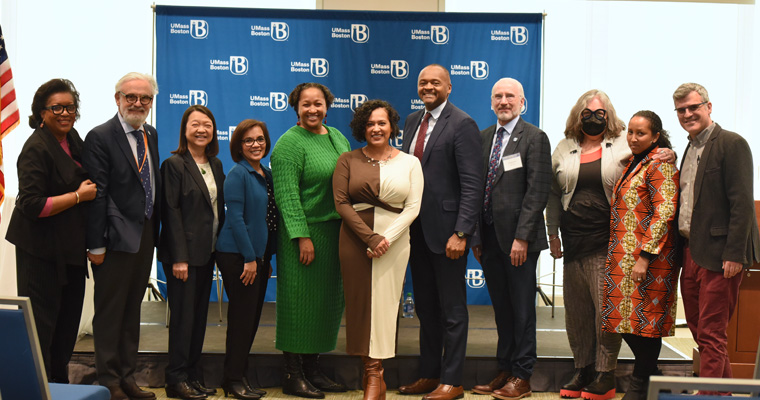
The event is hosted annually by the Office of Community Partnerships and co-sponsored by the Office of Alumni Engagement, Mass Media, Quinn Graphics, and Student Leadership and Community Engagement at UMass Boston.
